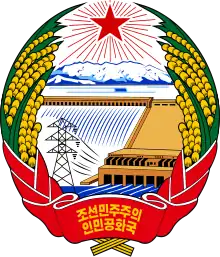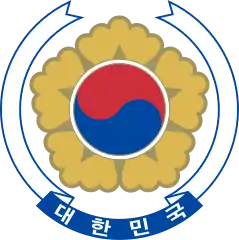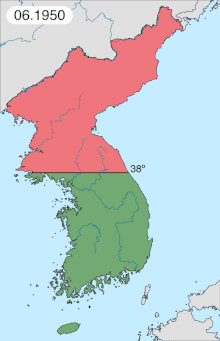Korea and the United Nations
The Republic of Korea (commonly known as South Korea) and the Democratic People's Republic of Korea (commonly known as North Korea) were simultaneously admitted to the United Nations (UN) in 1991. On 8 August 1991, the UN Security Council passed United Nations Security Council Resolution 702, recommending both states to the UN General Assembly for membership. On 17 September 1991, the General Assembly admitted both countries under Resolution 46/1.
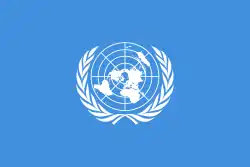  | |
| United Nations membership | |
|---|---|
| Membership | Full member |
| Since | September 17, 1991 |
| UNSC seat | Non-permanent |
| Permanent Representative | Oh Joon |
 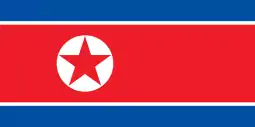 | |
| United Nations membership | |
|---|---|
| Membership | Full member |
| Since | September 17, 1991 |
| UNSC seat | Non-permanent (never elected) |
| Permanent Representative | Kim Song |
| Part of a series on |
| North Korea and the United Nations |
|---|
  |
History
On December 12, 1948, The Republic of Korea was officially recognized by the UN General Assembly (UNGA) under Resolution 195.[1][lower-alpha 1] Since then, South Korea participated in the GA as an observer.
In 1950, North Korea invaded South Korea, and the Korean War commenced. The UN Security Council denounced the invasion, and "recommended that Members of the United Nations furnish such assistance to the Republic of Korea as may be necessary to repel the armed attack and to restore international peace and security in the area," and "that all Members providing military forces and other assistance...make such forces and other assistance available to a unified command under the United States of America," and authorized this new United Nations Command "at its discretion to use the United Nations flag in the course of operations against North Korean forces..."[2] Sixteen nations responded by sending combat troops (and five other countries sent humanitarian aid) to support South Korea.
Coming with change of recognition in 1971 of the Chinese seat, North Korea also gained observer status. North Korea has never held a seat on the UN Security Council.[3] It has a Permanent Mission to the UN in New York City, and additionally maintains a mission to the UN in Paris and an Ambassador to the UN at the UN Office at Geneva.[4][5]
South Korea has twice been elected to a non-permanent seat of the UN Security Council, first in the 1995 election for 1996–97 and again in the 2012 election for 2013–14.[6][7]
In 2001, Han Seung-soo of South Korea held the presidency of the UNGA.[8] In 2006, Ban Ki-moon from South Korea was elected as the Secretary-General of the United Nations. He was re-elected in 2011.[9][10]
Since 2005, the UNGA has adopted a resolution every year to condemn the human rights situation in North Korea.[11]
In December 2019, US Ambassador to the United Nations Kelly Craft said during a meeting of the UN Security Council that was called at her request that the US was prepared to take "simultaneous steps" with North Korea to achieve peace.[12][13] But she also warned the North Koreans against conducting further missile tests.[12][13]
Notes
- The recognition was refused by Soviet Union and other communist states at the first time.
References
- "ODS HOME PAGE" (PDF). documents-dds-ny.un.org.
- "Resolution 84: Complaint of aggression upon the Republic of Korea". United Nations. Retrieved 2020-03-09.
- "Countries Never Elected Members of the Security Council". United Nations. Retrieved 2016-10-04.
- "Countries that have established diplomatic relations with the DPRK". North Korea in the World. East-West Center, The National Committee on North Korea. Retrieved 16 December 2020.
- Nebehay, Stephanie (22 May 2019). "North Korea Says 'Biggest Issue' in U.S. Ties Is Impounded Ship". Reuters. Retrieved 7 December 2020.
- "ASSEMBLY ELECTS CHILE, EGYPT, GUINEA-BISSAU, POLAND, REPUBLIC OF KOREA TO TWO-YEAR TERMS ON SECURITY COUNCIL | Meetings Coverage and Press Releases". www.un.org.
- "Argentina, Australia, Luxembourg, Republic of Korea and Rwanda obtain non-permanent seats on UN Security Council". UN News. 2012-10-18.
- "HAN SEUNG-SOO OF REPUBLIC OF KOREA ELECTED PRESIDENT OF FIFTY-SIXTH GENERAL ASSEMBLY SESSION | Meetings Coverage and Press Releases". www.un.org.
- "Ban Ki-moon". United Nations Secretary-General. 2016-11-28.
- "Ban Ki-moon appointed next UN Secretary-General by acclamation". UN News. 2006-10-13.
- "Resolution on N. Korea's human rights violations presented to U.N. committee". Archived from the original on 2018-02-03. Retrieved 3 June 2021.
- "Remarks at a UN Security Council Briefing on Nonproliferation and the DPRK". United States Mission to the United Nations. December 11, 2019.
- Gladstone, Rick (December 12, 2019). "After North Korea Hints at New Policy, U.S. Warns Against More Missile Tests; The American ambassador to the United Nations, responding to North Korean signals that it could resume long-range missile tests, said such a move would be 'deeply counterproductive.'". The New York Times.
Further reading
- Chi Young Pak (2000). Korea and the United Nations. The Hague: Martinus Nijhoff Publishers. ISBN 978-90-411-1382-5.
- Jonsson, Gabriel (2017). South Korea in the United Nations: Global Governance, Inter-Korean Relations and Peace Building. World Scientific. ISBN 978-1-78634-193-8.
- Kŭktong Munje Yŏnʾguso (1973). North Korea's Policy Toward the United Nations. Institute for East Asian Studies.
External links
- Ministry of Foreign Affairs of the Republic of Korea.
- Permanent Mission of the Republic of Korea to the United Nations.
- UN General Assembly Resolution 195.
- Documents at the Wilson Center Digital Archive.
